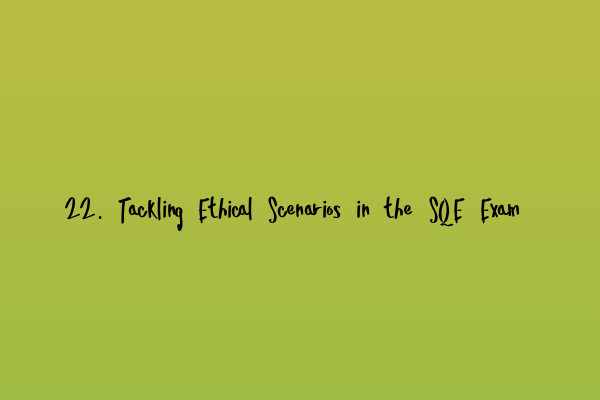Tackling Ethical Scenarios in the SQE Exam
Welcome to SQE Exam Law, your ultimate resource for all things related to the Solicitors Qualifying Examination (SQE). As an aspiring solicitor, it is crucial to develop a thorough understanding of ethical principles and their application in practice. In the SQE exam, you can expect a variety of scenarios that test your ability to identify and address ethical dilemmas.
In this article, we will explore some effective strategies to tackle ethical scenarios in the SQE exam and maximize your chances of success. Let’s dive in!
1. Familiarize Yourself with the SRA Code of Conduct
The Solicitors Regulation Authority (SRA) has established a comprehensive Code of Conduct that governs the professional behavior of solicitors. It is essential to familiarize yourself with this code to understand the ethical standards expected of you in the exam and in your future legal career. Being well-versed in the SRA Code of Conduct will enable you to identify relevant ethical duties and apply them accurately in exam scenarios.
For a detailed overview of the SRA Code of Conduct, you may refer to our related article: Unveiling the SRA Syllabus for the SQE.
2. Analyze the Scenario Carefully
When faced with an ethical scenario in the SQE exam, take a deep breath and read the scenario carefully. Pay close attention to the facts, parties involved, and any relevant legal or ethical obligations that may arise. It is crucial to understand the situation fully before jumping to any conclusions or making hasty decisions.
3. Identify the Ethical Issues
Once you have a clear understanding of the scenario, identify the ethical issues at stake. Look for any potential conflicts of interest, breaches of confidentiality, or violations of professional conduct. By identifying these issues, you can effectively address them in your response and demonstrate your ethical awareness and analytical skills.
4. Apply Ethical Principles and Rules
Referencing the SRA Code of Conduct, apply the relevant ethical principles and rules to the scenario at hand. Consider the duties owed to clients, the court, and other parties involved. Think about the potential consequences of different courses of action and how they align with ethical obligations.
For additional guidance on how to apply ethical principles in the SQE exam, you may find our related article helpful: Conquer the SQE: Insider Tips and Study Tricks for Success.
5. Evaluate and Justify Your Response
When providing your answer, be sure to evaluate different options and justify your chosen course of action. Consider the potential impact on all stakeholders involved and weigh the ethical implications of each option. Your ability to critically assess the situation and provide a well-reasoned response will showcase your ethical reasoning and decision-making abilities.
6. Review and Practice Ethical Scenarios
To further enhance your ethical problem-solving skills, regularly review and practice ethical scenarios. Familiarize yourself with different types of ethical dilemmas that frequently arise in legal practice. By practicing various scenarios, you will become more comfortable and proficient in tackling ethical questions, ultimately improving your performance in the SQE exam.
To access additional resources and expert insights on tackling ethical scenarios, you may find our related article on webinars helpful: Unlocking Knowledge with SQE Webinars: Expert Insights at Your Fingertips.
Conclusion
In conclusion, mastering the art of tackling ethical scenarios in the SQE exam requires a solid understanding of the SRA Code of Conduct, careful analysis of the scenario, the identification and application of relevant ethical principles, and the evaluation and justification of your response. Regular practice and review of ethical scenarios will further enhance your skills and enable you to excel on exam day.
For more helpful articles and resources, check out our comprehensive review of SQE course providers: Review of SQE Course Providers: Choosing the Best Fit.
Good luck with your SQE exam preparation, and remember, ethical excellence is the cornerstone of a successful legal career!
